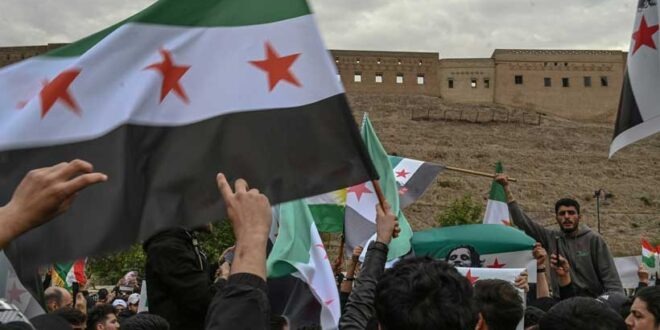What happened in Syria cannot be summarized as the fall of the ruling regime and the rise of another, due to Syria’s importance in the balance of power within regional and international politics.
Syria’s importance lies in the fact that, for decades, it has been the “balance of power” in several conflicts, most notably the Arab-Israeli conflict.
It is true that Syria did not fight alone, but it played a decisive role in preventing a real peace agreement between Israel and the other Arab countries, particularly Lebanon.
Syria’s fear of being isolated by Israel drove it to play the role of “the disruptor” of any Israeli-Arab rapprochement, relying on Arab public opinion that still rejects normalization with the Zionist entity and believes in the Palestinian people’s right to self-determination.
The grand slogans raised by Syria remained just slogans, and it became clear that it was impossible to think about the possibility of achieving them, as this had become a matter of fantasy.
The slogan of “Arab Unity,” which we continued to repeat in our schools and literature, ended up being reduced to just talk about Syrian unity, after its division seemed increasingly like a reality.
The slogan of “freedom” ended up leading many to prisons merely for expressing a thought or opinion that did not align with the ruling faction’s policies. They excelled in silencing the Syrians and were pioneers in creating what was called the “Cybercrime Law,” a sword hanging over the necks of writers and intellectuals, turning many of them into “criminals” merely for publishing an idea or opinion on their Facebook page.
As for “socialism,” it remained an unfulfilled slogan, while the reality reached the point of plundering the state’s economy and transferring the ownership of many of its institutions to a group of people who were merely fronts and business managers for the fleeing president and his wife.
The downfall of the previous regime may seem logical in terms of its result, given the people’s “psychological rupture” with it, even in the areas that once served as its supportive base.
As confidence from its allies waned, it spent years trying to engage in a “tightrope” policy, attempting to combine contradictory elements, hoping to find a “lifeline,” no matter the cost.
I am not here to discuss the regime’s mistakes and policies, as everyone knows them, and discussing them would require several volumes. However, what is important to me is reading the Syrian event and focusing on its repercussions on the region and the world.
The Syrian Event and Its Repercussions on the Region
Syria was certainly not an international player, but it excelled in being a regional player due to its position and significance, as the heart of the Arab world. The Israeli conflict with Syria placed obligations on other Arab countries, making these obligations seem like an “entitlement” from the perspective of the former Syrian leadership.
Syria has political ties with other Arab countries that are historically deep-rooted, and the Syrian people view themselves as part of the Arab nation, influencing and being influenced by it. This historical truth means that what happens in one Arab country affects others.
The “domino theory” applies strongly to the Arab scene, as what happened in Tunisia spread to other Arab countries, despite all efforts to prevent it.
Initially, the previous regime tried to prevent the Tunisian scenario from repeating in Syria. However, its end was closer to that of the Tunisian president (fleeing), with the difference being that the Syrian regime only left after destroying the country, while Zine El Abidine Ben Ali left early and spared Tunisia further bloodshed.
Today, as a result of what happened in Syria, many Arab countries should be worried, with Jordan, Iraq, Egypt, the UAE, and Saudi Arabia being at the forefront.
For example, Egypt and Syria were once one country, not only during the unity led by Gamal Abdel Nasser, but their unity lasted for 650 years before that, since the time of Ahmad ibn Tulun. The Ottoman occupation dismantled the unity of Egypt and Greater Syria, and today, Turkey is strongly present in the Syrian scene, which increases the concerns of the Egyptian government that came to power after the Muslim Brotherhood.
Salafists also make up a significant portion of the Jordanian street, with many demands and grievances toward the official system.
Saudi Arabia feels significant concern about the “Shiite” opposition in the east of the kingdom, and Crown Prince Mohammed bin Salman hopes for a smooth and quiet transfer of power, as he would be the first king not from the sons of Abdulaziz.
The UAE also has concerns about the increasing influence of Turkey and Qatar in the new Syria, fearing the success of any model with a religious reference in managing any Arab state.
Iraq is more concerned because it is part of the resistance axis led by Iran, and Syria has always been an integral part of it.
The Winners and Losers of What Happened in Syria
There is no doubt that Iran and Russia are the biggest losers in what happened in Syria, as they were the main supporters of the regime.
The problem for both countries is that Assad has become a burden on them, and he is no longer a reliable ally. His lies have become a truth that cannot be overlooked or ignored.
Assad’s rapprochement with the Arab countries was at the expense of Tehran, and his retreat from the Gaza events was evidence of this.
Changes in Iran since the assassination of President Ibrahim Raisi and the increasing Israeli targeting of Iranian forces inside Syria have heightened Tehran’s concerns.
Tehran was not convinced that someone who gave Israel the coordinates of its forces and the locations of its advisors was far from the power and decision-making in Syria. They also did not find it convincing to solely blame Louna al-Shaboul for this responsibility.
Despite Tehran’s shaken trust in Assad, it was forced to cooperate with him. However, it was no longer willing to defend him directly and preferred to limit its role to supporting and backing the Syrian army.
As for Russia today, it is no longer the same as it was in 2015 when it decided to intervene in Syria. The Ukrainian crisis has now become the primary determinant of its policies and directions.
From the beginning, Russia’s stance centered around the idea of preventing the collapse of the Syrian state, and it was not fixated on President Assad. Therefore, it repeatedly called for a political solution, in line with Resolution 2254, which it had supported.
Russia also now needs to reach agreements with Turkey, given Turkey’s significance in the Russian-Western conflict over Ukraine.
Although Syria is important to Moscow, it pales in comparison to Russia’s interests with Ankara. The trade exchange in the agricultural sector alone reached 3 billion dollars, and the cooperation between the two countries in the tourism sector has reached 15 billion dollars. Additionally, Moscow supplied Ankara with S-400 missiles, built nuclear power plants to generate electricity, and the two countries cooperate in the energy sector.
As for the European Union, despite its desire to end Russia’s presence in Syria, it preferred that Syria remain an open front to confront the Russian army to prevent it from focusing solely on the Ukrainian front.
The transfer of Russian forces from Syria to Libya also constitutes additional pressure on Europe, due to Libya’s proximity and its special relationship with Europe, as well as the need to prevent it from becoming a source of terrorism from the southern Mediterranean to the northern part.
What matters to Russia today is maintaining its military bases in Syria. Therefore, it has started withdrawing its forces from all parts of Syria and prevented its aircraft from supporting Assad’s forces in the battles in Aleppo and Hama.
The United States
It is certain that Syria was not a priority for the United States. If the U.S. wanted to decisively end the conflict in Syria, it would have replicated the Libyan scenario and eliminated Assad from the start.
The Middle East, in general, has no longer been a priority for the U.S. after securing Israel’s security and ensuring its self-sufficiency in oil needs. The U.S. now wants to focus on its upcoming battle with China.
After the fall of the Syrian regime, the U.S. did not recognize the transitional government in Damascus and announced that it met with representatives of Hay’at Tahrir al-Sham at the Four Seasons Hotel, not at the presidential palace.
The continuation of the Caesar Act by the United States leaves no doubt that the target is the Syrian people, not the regime. Since the regime has fallen, there is no justification for maintaining these sanctions other than to increase pressure on Syria’s new rulers.
Turkey
Turkey can be considered one of the biggest beneficiaries of the regime’s fall in Syria. This has resolved the Syrian refugee crisis for Turkey and brought a regime friendly to Ankara into power, at least in the short term.
Additionally, the popularity of the Justice and Development Party (AKP) and President Erdogan has risen, especially after it had recently declined due to his repeated calls for meetings with Assad, which were rejected.
New Rulers of Syria and the Challenges of State-Building
Despite the success of Hay’at Tahrir al-Sham in toppling the Syrian regime, they face many challenges ahead, and there are numerous concerns they must address, especially regarding the minorities within Syria.
The first challenge facing the group is the need for ideological revisions in transitioning from the “group’s ideology” to the “state-building ideology.” This requires making many compromises and prioritizing political pragmatism over ideological principles and foundations.
Hay’at Tahrir al-Sham has dealt with political realism and pragmatism, which is to its credit. However, the process of building a state requires them to undergo an intellectual and ideological change and to communicate with the world using contemporary political language.
Abandoning their identity as a group and adopting the logic and mindset of a state requires them to address the Kurdish issue, reassure the Alawites, celebrate Christian holidays with them, and take other similar measures.
It is important to give them sufficient time for this transformation and to remind them that the Syrian people no longer accept humiliation and subjugation. They must learn from the mistakes of the previous regime.
The transitional government succeeded in issuing many economic decisions that quickly improved the living conditions of Syrians due to the decrease in prices of many goods and services, which certainly left a positive impression.
However, many of the administrative decisions issued by the transitional government in Syria exceed its authority in my opinion, and place burdens on the next government, which will inherit a heavy legacy of economic corruption and administrative inefficiency.
Addressing the status of the army and police personnel is one of the first challenges for both the current and future governments, especially since not all members of these institutions have blood on their hands.
There are also significant questions regarding Syria’s foreign policy that the government must address. At the top of these questions is the stance on the occupied Golan Heights and the Palestinian issue, especially since Hay’at Tahrir al-Sham is concerned with liberating the entire Levant, not just Syria.
There are concerns that “political Islam” could turn into “submissive Islam,” held by some in Syria and many freedom-loving individuals across the Arab world.
These fears can be dispelled through actions, work, and calm political discourse, not through the language of force and arrogance. Bullets will not solve any problems between the two sides, and the group’s discourse of calm and unity aligns with this vision.
Rejecting the dominance of any state over Syria’s political decisions necessarily means not transferring that dominance to another state. Sovereignty is indivisible, and respecting Syria’s sovereignty is something that everyone must understand.
While it is true that the Syrian people can breathe a sigh of relief today, the Syrian homeland is on the verge of collapse, economically and militarily. Syria today is a “disaster-stricken state” in every sense of the word, which only magnifies the challenges facing Syria’s new rulers. We must understand the heavy legacy left behind by the previous regime.
The diplomatic pilgrimage to Damascus may not necessarily express the joy and euphoria that those countries feel from the fall of Assad’s regime, but it certainly reflects the fears of those countries and their desire to have a share of the Syrian pie.
It is worth noting that the concept of “sovereignty” is relative and no longer absolute as Joe Bodin discussed. Successful governments are those that retain a larger margin of freedom and have the ability to minimize foreign interventions.
It must be emphasized that changing the leadership is not the ultimate goal of the revolution. Preserving Syria’s political, cultural, and sectarian diversity is essential, and only then can we talk about a revolution in Syria, not a revolution against it.
In Syria, there is only anxiety and fear, and there is no reason for reassurance. There are those who are waiting to sabotage its revolution and fail its experiment in state governance.
It is certain that what happened in Syria will change the entire region, and it seems that achieving stability in Syria will not be easy, as many had hoped.
 Geostrategic Media Political Commentary, Analysis, Security, Defense
Geostrategic Media Political Commentary, Analysis, Security, Defense





